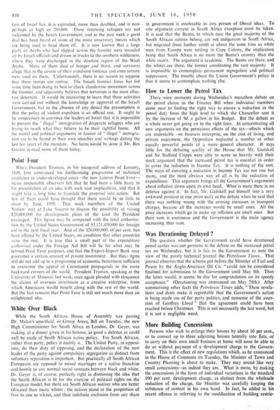How to Lower the Petrol Tax
There were moments during Wednesday's marathon debate on the petrol clause in the Finance Bill when individual members came near to finding the right way to ensure a reduction in the petrol duty from the high level to which the Chancellor sent it by the increase of 9d. a gallon in his Budget. But the debate as a whole never got going on to the right lines. In concentrating all new arguments on the pernicious effects of the tax—effects which are undeniable—on business enterprise, on the cost of living, and private enjoyment, the Opposition neglected a number of other equally powerful points of a more general character. It says little for the debating quality of the House that Mr. Gaitskell and Sir Stafford Cripps were able to score so heavily with their stock argument that the increased petrol tax is essential in order to cover the reduction in Income Tax. It is nothing of the sort. The ways of ensuring a reduction in Income Tax are not one but many, and the most obvious way of all is by the reduction of expenditure. This argument brings all the Government's arguments about inflation down upon its own head. What is more there is no defence against it. In fact, Mr. Gaitskell put himself into a very awkward position at one point early in the debate when he said that there was nothing wrong with the coming increases in transport charges, because all the increases would be small ones. All the price increases which go to make up inflation are small ones But their sum is enormous and the Government is the main agency increasing that sum.




































 Previous page
Previous page